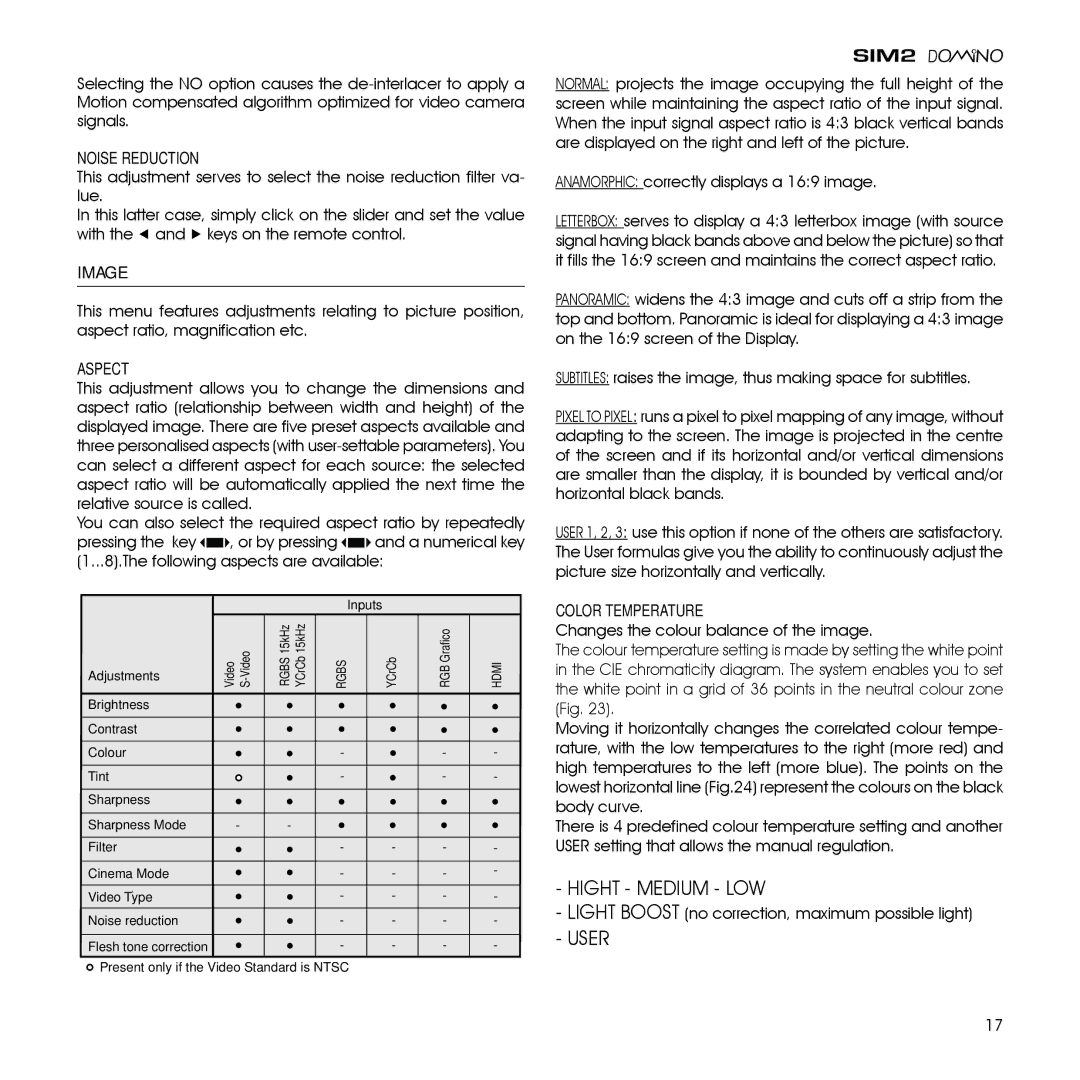
Selecting the NO option causes the
NOISE REDUCTION
This adjustment serves to select the noise reduction filter va- lue.
In this latter case, simply click on the slider and set the value with the ◀ and ▶ keys on the remote control.
IMAGE
This menu features adjustments relating to picture position, aspect ratio, magnification etc.
Aspect
This adjustment allows you to change the dimensions and aspect ratio (relationship between width and height) of the displayed image. There are five preset aspects available and three personalised aspects (with
You can also select the required aspect ratio by repeatedly
pressing the key ![]()
![]()
![]() , or by pressing
, or by pressing ![]()
![]()
![]() and a numerical key (1...8).The following aspects are available:
and a numerical key (1...8).The following aspects are available:
|
|
|
| Inputs |
|
|
Adjustments | Video | RGBS15kHz YCrCb15kHz | RGBS | YCrCb | RGBGrafico | HDMI™ |
|
|
|
|
|
| |
Brightness |
|
|
|
|
|
|
|
|
|
|
|
| |
Contrast |
|
|
|
|
|
|
Colour |
|
| - |
| - | - |
Tint |
|
| - |
| - | - |
Sharpness |
|
|
|
|
|
|
|
|
|
|
|
|
|
Sharpness Mode | - | - |
|
|
|
|
Filter |
|
| - | - | - | - |
|
|
|
|
|
|
|
Cinema Mode |
|
| - | - | - | - |
Video Type |
|
| - | - | - | - |
Noise reduction |
|
| - | - | - | - |
|
|
|
|
|
|
|
Flesh tone correction |
|
| - | - | - | - |
![]() Present only if the Video Standard is NTSC
Present only if the Video Standard is NTSC
Normal: projects the image occupying the full height of the screen while maintaining the aspect ratio of the input signal. When the input signal aspect ratio is 4:3 black vertical bands are displayed on the right and left of the picture.
Anamorphic: correctly displays a 16:9 image.
Letterbox: serves to display a 4:3 letterbox image (with source signal having black bands above and below the picture) so that it fills the 16:9 screen and maintains the correct aspect ratio.
Panoramic: widens the 4:3 image and cuts off a strip from the top and bottom. Panoramic is ideal for displaying a 4:3 image on the 16:9 screen of the Display.
SUBTITLES: raises the image, thus making space for subtitles.
Pixel to Pixel: runs a pixel to pixel mapping of any image, without adapting to the screen. The image is projected in the centre of the screen and if its horizontal and/or vertical dimensions are smaller than the display, it is bounded by vertical and/or horizontal black bands.
User 1, 2, 3: use this option if none of the others are satisfactory. The User formulas give you the ability to continuously adjust the picture size horizontally and vertically.
Color Temperature
Changes the colour balance of the image.
The colour temperature setting is made by setting the white point in the CIE chromaticity diagram. The system enables you to set the white point in a grid of 36 points in the neutral colour zone (Fig. 23).
Moving it horizontally changes the correlated colour tempe- rature, with the low temperatures to the right (more red) and high temperatures to the left (more blue). The points on the lowest horizontal line (Fig.24) represent the colours on the black body curve.
There is 4 predefined colour temperature setting and another USER setting that allows the manual regulation.
-HIGHT - MEDIUM - LOW
-LIGHT BOOST (no correction, maximum possible light)
-USER
17
